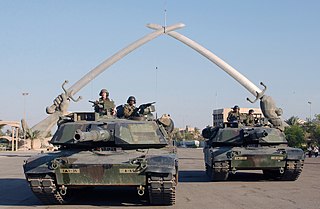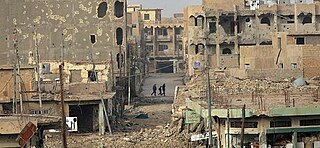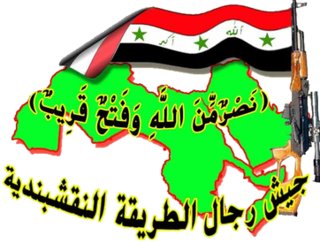Related Research Articles

Izzat Ibrahim al-Douri was an Iraqi politician and army field marshal. He served as Vice Chairman of the Iraqi Revolutionary Command Council until the 2003 U.S. invasion of Iraq and was regarded as the closest advisor and deputy under President Saddam Hussein. He led the Iraqi insurgent group Naqshbandi Army.

The following is a timeline of major events during the Iraq War, following the 2003 invasion of Iraq.

Jama'at al-Tawhid wal-Jihad, abbreviated as JTJ or Jama'at, was a Salafi jihadist militant group. It was founded in Jordan in 1999, and was led by Jordanian national Abu Musab al-Zarqawi for the entirety of its existence. During the Iraqi insurgency (2003–11), the group became a decentralized network with foreign fighters with a considerable Iraqi membership.

An Iraqi insurgency began shortly after the 2003 American invasion deposed longtime leader Saddam Hussein. It is considered to have lasted until the end of the Iraq War and U.S. withdrawal in 2011. It was followed by a renewed insurgency.

The Badr Organization, previously known as the Badr Brigades or Badr Corps, is an Iraqi Shia Islamist and Khomeinist political party and paramilitary organization headed by Hadi al-Amiri. The Badr Brigade, formed in 1982 and led by Iranian officers, served as the military arm of the Supreme Council for Islamic Revolution in Iraq (SCIRI), a Shia Islamic party based in Iran. The Badr Brigade was created by Iranian intelligence and Shia cleric Mohammad Baqir al-Hakim with the aim of fighting the Ba'athist regime of Saddam Hussein during the Iran–Iraq War. Since the 2003 US-led invasion of Iraq most of the Badr Brigades' fighters have entered the new Iraqi army and police force. Politically, Badr Brigade and SCIRI were considered to be one party since 2003, but have now unofficially separated with the Badr Organization now an official Iraqi political party. Badr Brigade forces, and their Iranian commanders, have come to prominence in 2014 fighting the Islamic State of Iraq and the Levant (ISIL) in Iraq. It is a part of the Popular Mobilization Forces.

The Iraqi civil war was an armed conflict from 2006 to 2008 between various sectarian Shia and Sunni armed groups, such as the Islamic State of Iraq and the Mahdi Army, in addition to the Iraqi government alongside American-led coalition forces. In February 2006, the insurgency against the coalition and government escalated into a sectarian civil war after the bombing of Al-Askari Shrine, considered a holy site in Twelver Shi'ism. US President George W. Bush and Iraqi officials accused Al-Qaeda in Iraq (AQI) of orchestrating the bombing. AQI publicly denied any links. The incident set off a wave of attacks on Sunni civilians by Shia militants, followed by attacks on Shia civilians by Sunni militants.

Iraqi Assyrians are an ethnic and linguistic minority group, indigenous to Upper Mesopotamia. They are defined as Assyrians residing in the country of Iraq, or members of the Assyrian diaspora who are of Iraqi-Assyrian heritage. They share a common history and ethnic identity, rooted in shared linguistic, cultural and religious traditions, with Assyrians in Iran, Turkey and Syria, as well as with the Assyrian diaspora elsewhere. A significant number have emigrated to the United States, notably to the Detroit and Chicago; a sizeable community is also found in Sydney, Australia.

The 1991 Iraqi uprisings were ethnic and religious uprisings against Saddam Hussein's regime in Iraq that were led by Shi'ites and Kurds. The uprisings lasted from March to April 1991 after a ceasefire following the end of the Gulf War. The mostly uncoordinated insurgency was fueled by the perception that Iraqi President Saddam Hussein had become vulnerable to regime change. This perception of weakness was largely the result of the outcome of the Iran–Iraq War and the Gulf War, both of which occurred within a single decade and devastated the population and economy of Iraq.

Refugees of Iraq are Iraqi nationals who have fled Iraq due to war or persecution. In 1980- 2017, large number of refugees fled Iraq, peaking with the Iraq War and continuing until the end of the War in Iraq (2013–2017). Precipitated by a series of conflicts including the Kurdish rebellions during the Iran–Iraq War, Iraq's Invasion of Kuwait (1990) and the Gulf War (1991), the subsequent sanctions against Iraq (1991–2003), culminating in the Iraq War and the subsequent War in Iraq (2013–2017), millions were forced by insecurity to flee their homes in Iraq. Iraqi refugees established themselves in urban areas in other countries rather than refugee camps.

The Christians of Iraq are considered to be one of the oldest continuous Christian communities in the world.
Iraqis in Lebanon are people of Iraqi origin residing in Lebanon and Lebanese citizens of Iraqi ancestry. Statistics for Iraqi refugees in Lebanon vary, but typically put the number at around 50,000.

Palestinians in Iraq are people of Palestinians, most of whom have been residing in Iraq after they were displaced in 1948. Before 2003, there were approximately 34,000 Palestinians thought to be living in Iraq, mainly concentrated in Baghdad. However, since the 2003 Iraq War, the figure lies between 10,000–13,000, although a precise figure has been hard to determine. The situation of Palestinians in Iraq deteriorated after the fall of Saddam Hussein and particularly following the bombing of the Al-Askari Mosque in 2006. Since then, with the rise in insecurity throughout Iraq, they have been the target of expulsion, persecution and violence by Shia militants, and the new Iraqi Government with militant groups targeting them for preferential treatment they received under the Ba'ath Party rule. Currently, several hundred Palestinians from Iraq are living in border camps, after being refused entry to neighbouring Jordan and Syria. Others have been resettled to third countries.
Since the late 1970s until the present, Iraq has witnessed numerous waves of refugees and emigrants due to significant events in its modern history. These events have led to the displacement of millions of Iraqis. These include over three decades of repression, periodic violent attacks, and massacres targeting the Kurdish population in the north and the Shi'a in the south, all carried out by Saddam Hussein's regime. Other factors include the Iran-Iraq War (1980-1988), the Gulf War of 1991, the prolonged economic sanctions until the overthrow of Saddam Hussein, and the 2003 US-led invasion of Iraq.

It is believed that members of Al-Qaeda are hiding along the border of Afghanistan and northwest sections of Pakistan. In Iraq, elements loosely associated with al-Qaeda, in the Jama'at al-Tawhid wal-Jihad organization commanded by Abu Musab al-Zarqawi, have played a key role in the War in Iraq.
The Iraq War resulted in multiple humanitarian crises.

The Army of the Men of the Naqshbandi Order (Arabic: جيش رجال الطريقة النقشبندية Jaysh Rijāl aṭ-Ṭarīqa an-Naqshabandiya), (JRTN) also called the Naqshbandi Army, was one of a number of underground Ba'athist and Sufi militant insurgency groups fighting U.S.-led Coalition forces in Iraq. Media frequently refers to the group by the initials JRTN, a romanization of its Arabic name. Supreme Command for Jihad and Liberation, technically the name of the umbrella organisation to which JRTN belongs, is also often used to refer to JRTN specifically.
Sectarian violence among Muslims is the ongoing conflict between Muslims of different sects, most commonly Shias and Sunnis, although the fighting extends to smaller, more specific branches within these sects, as well as Sufism. It has been documented as having gone on from Islam's beginnings up until contemporary times.

Relations between the Arab Republic of Iraq and State of Palestine have historically been close, with Palestinian Liberation Organization supported by the Ba'athist Iraqi regime during the second half of the 20th century, and vice versa, Iraqi Ba'athist regime supported by PLO leadership during the Gulf War. The State of Palestine has an embassy and consulate in Baghdad and Erbil accordingly, but Iraq doesn't have an embassy in Palestine.

The Iraqi insurgency was an insurgency that began in late 2011 after the end of the Iraq War and the withdrawal of U.S. troops from Iraq, resulting in violent conflict with the central government, as well as low-level sectarian violence among Iraq's religious groups.

The Iraqi conflict is a series of violent events that began with the 2003 American-led invasion of Iraq and deposition of Iraqi president Saddam Hussein, the most recent of which is the ISIS conflict, in which the Iraqi government declared victory in 2017.
References
- ↑ "Palestinians in Iraq" (PDF). fmreview.org. Archived from the original (PDF) on 12 October 2008. Retrieved 14 August 2007.
- ↑ "Content". Archived from the original on 2015-09-24. Retrieved 2021-08-17.
- ↑ "Error - Amnesty International". Archived from the original on 2019-03-31. Retrieved 2021-08-17.
- ↑ Sassoon, Joseph. The Iraqi Refugees: The New Crisis in the Middle East, Paperback Edition. I.B. Tauris, 2011., p. 75
- ↑ "Palestinian Refugees from Iraq in Critical Need of Protection".
- ↑ "Nowhere to Flee". Human Rights Watch. 9 September 2006.
- ↑ "Factsheet: Palestinian Refugees in Iraq". Archived from the original on 2009-07-20.
- ↑ http://www.unhcr.no/Pdf/Position_countryinfo_2007/Iraq%20guidelines.pdf%5B%5D
- ↑ Refugees, United Nations High Commissioner for. "Refworld | UNHCR's Eligibility Guidelines for Assessing the International Protection Needs of Iraqi Asylum-seekers". Refworld.
- ↑ "Iraq" (PDF). UNHCR Global Appeal 2007.
- ↑ ""Protocol for the Treatment of Palestinians in Arab States, Casablanca Protocol", accessed on March 12th 2011".